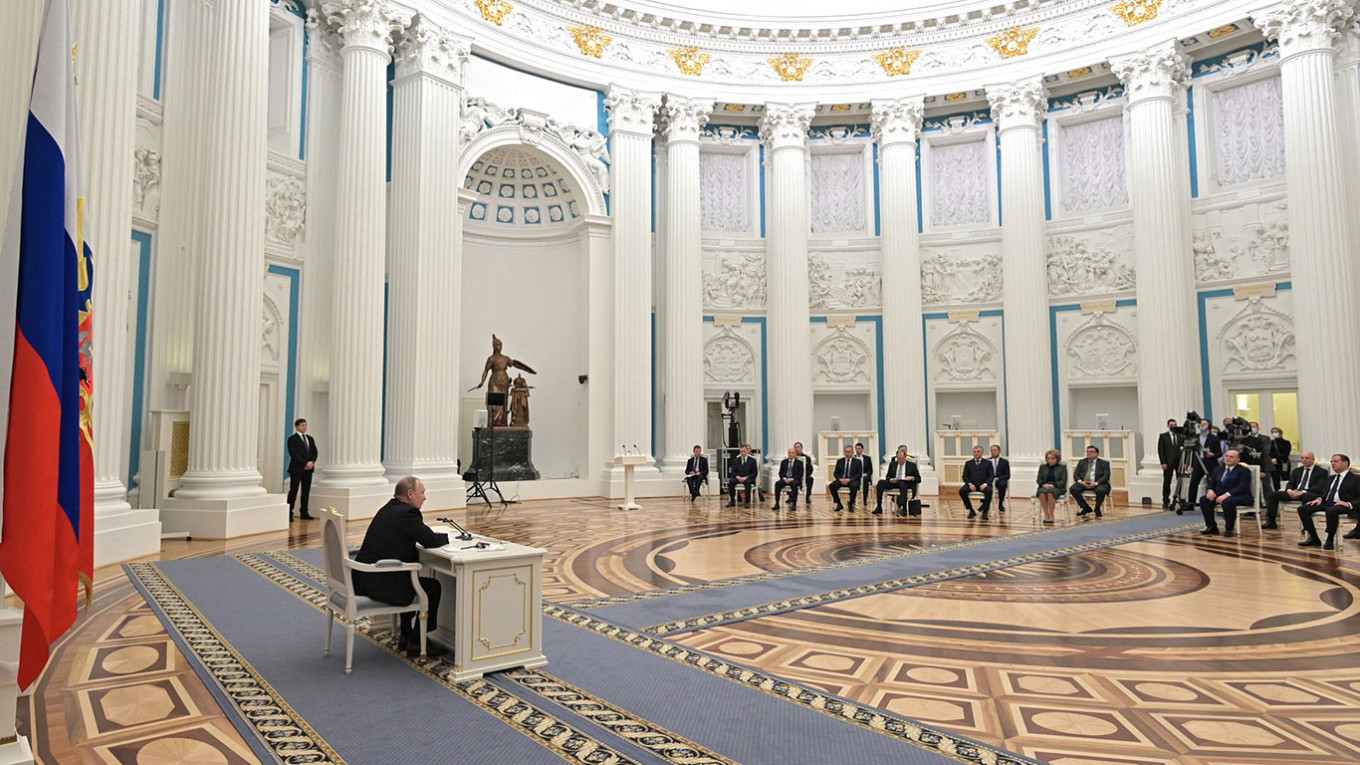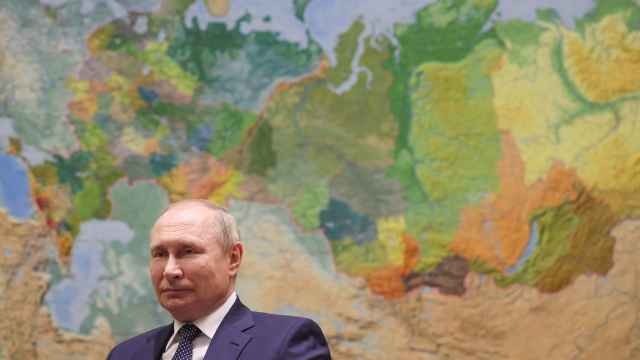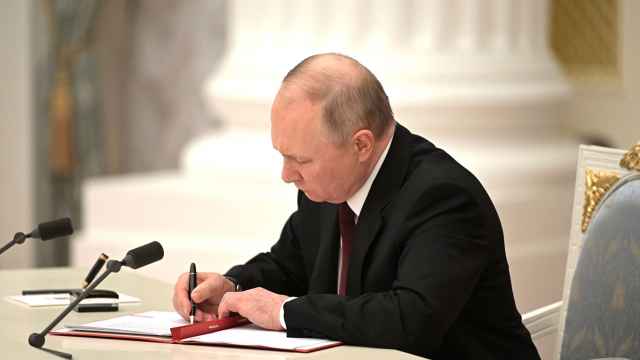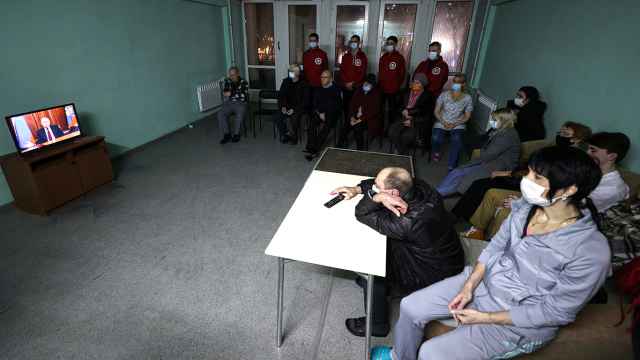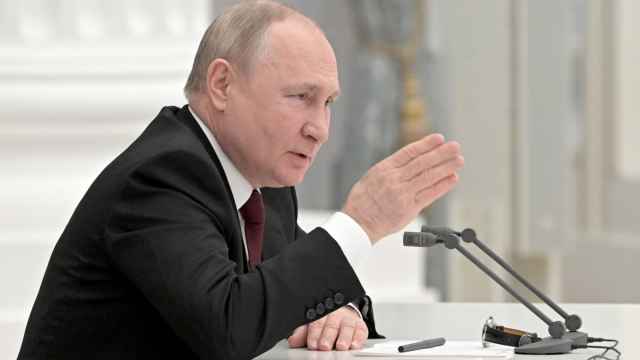Russia’s highest officials are often described as Vladimir Putin’s court. Based on Monday’s Security Council meeting, it is rather the president’s echo chamber.
Sometimes it is hard to get away from cinematic and theatrical references, but it seemed to be King Lear meets James Bond’s Ernst Stavro Blofeld. The topic was the Donbas and Luhansk pseudo-states, but although Putin said he would reach a decision later, it is clear that he had already chosen to recognize them.
The true drama was in how the most powerful men — and one woman — in Russia danced and squirmed around the president.
In contrast to most meetings of the Security Council, this was broadcast notionally across national television. Instead of online, this was held in person, the assembled grandees sitting distanced in rows far from Putin, ensconced behind a desk as in turn he demanded they express their opinion on recognition — with the clear understanding that there was only one right answer.
The militants
Some were clearly genuine enthusiasts. While FSB Director Alexander Bortnikov contributed a surreal report of alleged Ukrainian provocations and violations, his predecessor, Security Council Secretary Nikolai Patrushev framed the whole issue in positively eschatological terms, facing down those whose “goal is the destruction of Russia.”
Defence Minister Sergei Shoigu is always hard to read. He followed the same line as Bortnikov to a degree, but focused also on the dubious argument that Ukraine was planning nuclear rearmament. It was difficult to tell how committed he was to his line, though.
But they are all secure in Putin’s circle. Bortnikov and Patrushev share a common KGB background, a Leningrad/St. Petersburg background and a conspiratorial worldview with the president. Shoigu seems to have managed to build his own personal connection.
The real drama lay with those who could not count on that favour. In some ways this was a grey-suited re-run of King Lear, when the self-indulgent monarch demands his daughters compete in the over-the-top avowals of their love and obedience. This time, though, the contest is not for new lands but to retain old jobs.
The chorus
Federation Council Speaker Valentina Matviyenko harped on the supposed “genocide” being visited on ethnic Russians and Russian-speakers in Ukraine. Dmitri Medvedev, whose new position as Deputy Chair of the Security Council has given him a chance to try and reinvent himself as a hawk, all but implored everyone to think of the children. He affirmed that the people of Russia — singularly unenthused by the prospect of war in Ukraine so far — would expect and understand action with all the conviction of a man who lives in the gilded isolation of a modern boyar, only encountering ordinary Russians when they clean his limo or feed his ducks.
Likewise, Interior Minister Kolokoltsev may have gone improv, adopting the more maximalist position that Russia should not simply recognise the current borders of the pseudo-states but their claim to the whole of the Donetsk and Luhansk regions, including Mariupol.
Is he more hawkish than Patrushev and Bortnikov? Hardly, but he's also politically weak. This would not be the first time he has had to make a ritual display of passionate loyalty to protect his flank from the predators circling his ministry, from the FSB to the National Guard.
The skeptics
There was, after all, no scope for dissent. When not channelling King Lear, Putin was instead a virtual Blofeld without the white pussycat, coldly assessing his underlings and imposing his will on them all.
When Putin specifically asked whether anyone disagreed with his understanding of the situation, the silence was deafening. Nonetheless, it was clear that there were grandees there who were less enthused by the opportunity of openly violating international law and inviting more sanctions.
Foreign Minister Sergei Lavrov tried to avoid giving a straight answer on recognition of the pseudo-states until pressed, as did Prime Minister Mikhail Mishustin. He seemed distinctly uncomfortable and disgruntled, but then again when he wanted to talk economics, Putin — who in turn looked even more bored than usual — pushed him into a ritual endorsement of the new party line.
But Mishustin has every reason to be unhappy. He — along with the Presidential Administration’s Anton Vaino and Sergei Kirienko — has been charged with the national political and economic revival project. Any escalation, which at best will mean sanctions and at worst war, will make that vastly harder.
Likewise Dmitry Kozak, a pragmatic troubleshooter who had been the political point man for the Minsk talks — and who grew up in Ukraine — hid in wordage, giving a lengthy speech before, on being pressed, admitting that Kyiv was not going to accept the Russian formulation of the agreements, and that “they do not want to return Donbas to Ukraine.”
The straggler
When Kozak wanted to weigh in on the wider question of the future of the Donbas, though, Putin cut him off quickly and curtly, not once, but twice. Overall, one got the sense that Putin is really not passionate about human relations best practice. If he never faces a war crimes tribunal, he at least ought to face an industrial one, as he definitely seems to cultivate a toxic and unsafe work environment.
Just ask Sergei Naryshkin, Director of the Foreign Intelligence Service, who seems to have been the designated scapegoat of the gathering. He can probably feel relieved that, unlike Blofeld, Putin has not yet installed a piranha tank for his meeting.
He has been a good soldier throughout the crisis, pushing the official line publicly much more actively than Patrushev or Bortnikov. Yet unlike them, Naryshkin was never in Putin’s inner circle, and he was treated to a demeaning and needless demonstration of the boss’s power. He was, to be sure, much less suave than his usual public persona, standing at the podium when called on like a schoolboy singled out by the principal.
When he said he “will support” recognition of the pseudo-states, Putin tetchily pressed him: “will support, or do support? Tell me straight, Sergei Evgenievich.” When a clearly flustered Naryshkin, then said he supported “bringing them into Russia,” the president at once put him in his place again: “that’s not what we are discussing! Do you support recognising their independence?”
When the personal is political
The difference between cronies and staff could not have been made plainer by the way Putin bullied him on national television. In the past, we have seen oligarchs such as Oleg Deripaska and governors publicly dressed down, but this is one of the most senior figures within the government, the head of one of the intelligence services, and one of the fabled siloviki who are meant to represent Putin’s trusted henchmen.
All this actually has political relevance. One of the key reasons to believe that Putin would hold back from dramatic and potentially self-destructive escalation in Ukraine was precisely that he must appreciate the costs and the risks. If this meeting is anything to go by — and we have no reason to believe it is not representative — then this is not a man who is interested in alternative perspectives and open discussion.
Once, I was told by a Russian ex-intelligence officer that the services had learned that “you do not bring bad news to the tsar’s table.” We were all able to witness the degree to which that is true even of the most powerful figures in the land.
If Lavrov cannot tell him plainly what he must know about Western intentions. If Bortnikov and Shoigu confine themselves to relaying Russia’s own propaganda lines. If Mishustin cannot talk about the costs and Kozak about the real nature of the situation on the ground, then what can one expect?
The honest answer is that we don’t know, but it is worth noting that Lear ended up a madman in the wilderness before dying, and Blofeld seemingly written out of the Bond franchise.



